Police and MP Nigel Dodds injured in Belfast riots
- Published
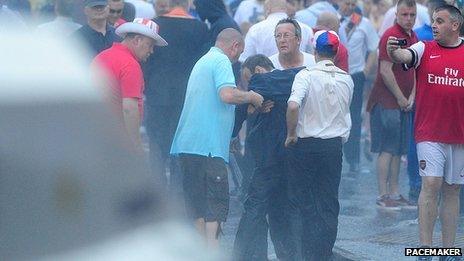
Nigel Dodds was hit by a missile after earlier appealing for calm in north Belfast
More than 30 police officers and MP Nigel Dodds were injured during six hours of rioting in Belfast.
Clashes developed when police enforced a ban on an Orange Order march in the north of the city on Friday evening.
The order had called for widespread demonstrations over the decision to ban marchers from a short stretch of road that separates loyalist and nationalist communities.
It later said it was suspending its protest.
Many families with children were caught up in the violence.
Petrol bombs, bricks and fireworks were thrown at the police who responded with water cannon and fired 20 plastic baton rounds.
North Belfast MP Mr Dodds was knocked unconscious during the riot and taken away in an ambulance.
The trouble started when the police blocked a road to enforce a determination made by the Parades Commission, preventing Orangemen from passing Ardoyne on the return route of their annual 12 July march.
The area has seen republican rioting in recent years when the parade was allowed to pass.
Clashes developed when police enforced a ban on an Orange Order march
The Orange Order had called for sustained protests at the decision but has since reeled back from that position.
The BBC's Andy Martin in Belfast says the fear of the police is that the "genie may already be out of the bottle".
Trouble
Loyalists do not necessarily take their lead from the Orange institutions.
Trouble broke out when the parade was stopped on the Woodvale Road.
Mr Dodds was hit by a missile thrown by loyalists at the junction of Woodvale Road and Woodvale Parade.
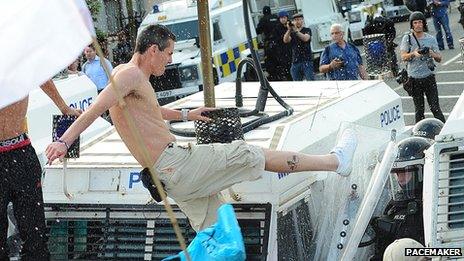
Water cannon and baton rounds have been used in north Belfast after violence broke out
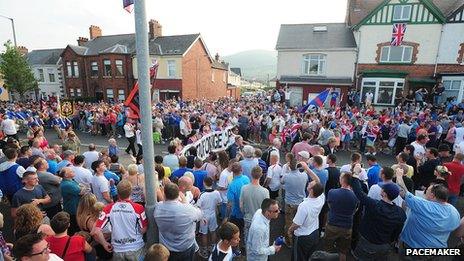
Police were enforcing a Parades Commission ban
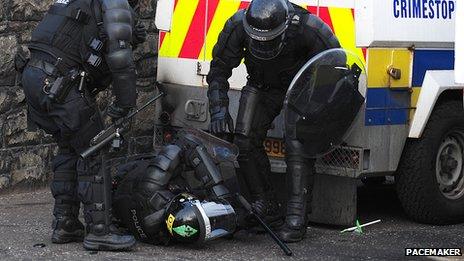
Four police officers and one civilian have been hurt
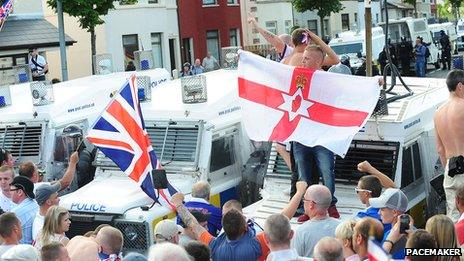
The Parades Commission ruling stops Orange Order lodges from walking on a stretch of road in north Belfast that separates loyalist and nationalist communities
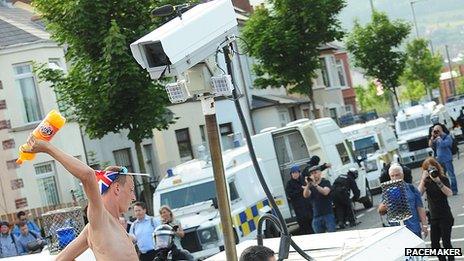
Bricks and bottles have been thrown
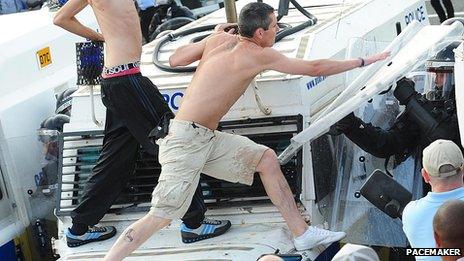
The water cannon and baton rounds were used on the Woodvale Road
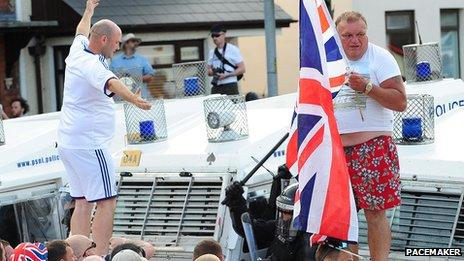
Police officers appealed for politicians to use any influence they could to calm the situation
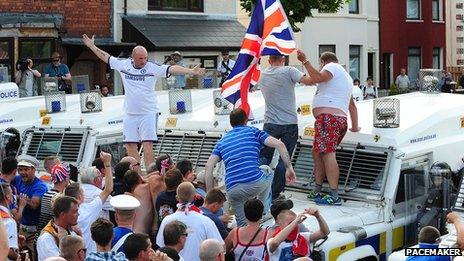
The lodges were allowed to walk on the stretch of road in the morning but were banned from doing so on their return in the evening
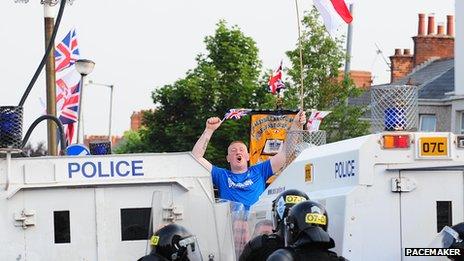
The Parades Commission said the lodges could go no further than the junction of Woodvale Road and Woodvale Parade
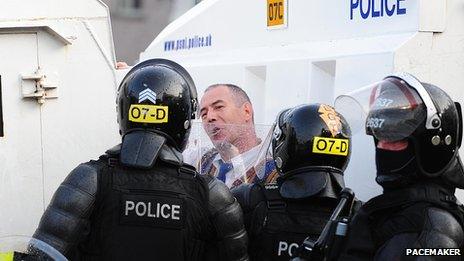
Police prevented them from walking between that point and the junction of the Crumlin Road and Hesketh Road
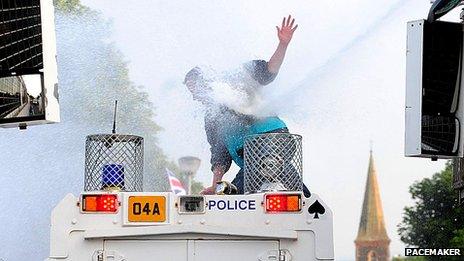
In recent years, there has been serious rioting in the nationalist Ardoyne area following the return leg of the parade
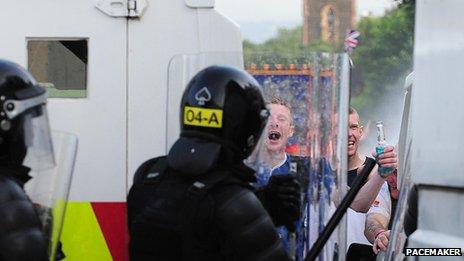
The Parades Commission ruling caused anger in loyalist communities
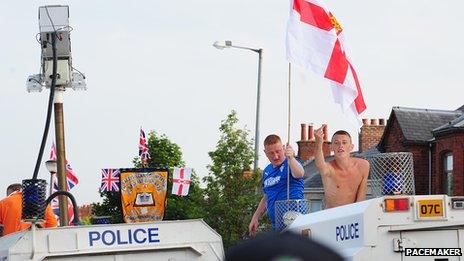
North Belfast MP Nigel Dodds appealed for calm in the area
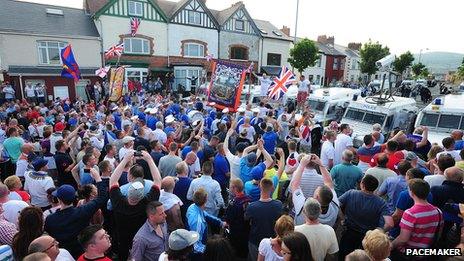
Every year on 12 July Orangemen march to commemorate William of Orange's victory over the Catholic King James II at the Battle of the Boyne in Ireland in 1690
A man who treated Mr Dodds at the scene, gave his account of what had happened.
"I was standing right beside him listening to his conversation," he said.
"He grasped his head as he went down. He was knocked out cold. I put him in the recovery position and checked his airway. A crowd gathered and then the ambulance arrived and he was taken away by ambulance. I felt sorry for the fella."
"He was unlucky because he was also hit by water cannon as I was trying to administer first aid and he got soaked," he added.
Northern Ireland executive minister Nelson McCausland, who was with Mr Dodds at the time of the incident, said the MP was "now conscious".
Mr Dodds was taken to the Royal Victoria Hospital in Belfast. He was treated and has since been discharged.
Water cannon and baton rounds were used after a sustained attack on police in north Belfast. Police were attacked with ceremonial swords as well as missiles. Later on Friday night, police were attacked with petrol bombs on the Woodvale Road.
Petrol bombs
The Parades Commission ruling stopped Orange Order lodges from walking on a stretch of road in north Belfast that separates loyalist and nationalist communities.
Trouble also broke out on the Newtownards Road in east Belfast with petrol bombs being thrown at police lines.
Earlier, missiles had been thrown as a parade passed St Matthew's Catholic church.
Petrol bombs, bricks and bottles thrown were thrown, and water cannon was used by police, in both north and east Belfast.
Earlier on Friday evening, Mr Dodds had appealed for calm following trouble.
"People who want to engage in violence should desist immediately," he said.
Northern Ireland First Minister and DUP leader Peter Robinson appealed for "cool heads" and said his thoughts were with those "who have been injured this evening, including my colleague Nigel Dodds".
North Belfast MP Nigel Dodds has been injured in violence that followed an Orange Order parade. Earlier he had appealed for calm and for people to refrain from violence.
The Grand Orange Lodge of Ireland has also called for calm.
Sinn Fein assembly member Gerry Kelly has blamed the Orange Order and unionist politicians for the violence.
He accused them of having a deliberate strategy that had produced "inevitable results".
Orange Order lodges in north Belfast, marched past the Ardoyne shops on Friday morning.
However, the Parades Commission, which rules on contentious parades, banned them from returning by the same route in the evening.
The ruling was that on their return, lodges would be stopped at the junction of Woodvale Road and Woodvale Parade.
Communities
They have been prohibited from walking between that point and the junction of the Crumlin Road and Hesketh Road.
The Parades Commission ruled that marchers would not be allowed to return along the part of the Crumlin Road, at Ardoyne shops, that separates nationalist and loyalist communities.
A woman has been hit by plastic baton round
The marching season in Northern Ireland is a period of events from April to August, with the highpoint on 12 July when Orangemen march to commemorate William of Orange's victory over the Catholic King James II at the Battle of the Boyne in Ireland in 1690.
William III is revered by the order as a champion of his faith. The Orange Order commemorate his victory in their annual parades.
Many Catholics see the marches as triumphalist and sectarian with some traditional Orange routes passing through or past areas occupied mainly by Catholics and nationalists.
The Parades Commission ruling on the north Belfast parade was welcomed by nationalist politicians but angered unionists.
- Published12 July 2013
- Published11 July 2013
- Published9 July 2013